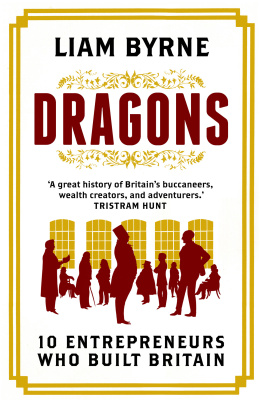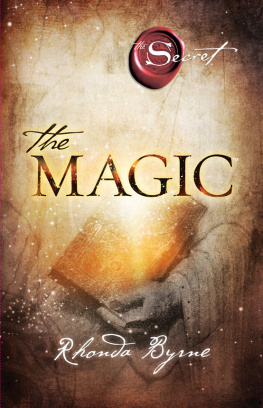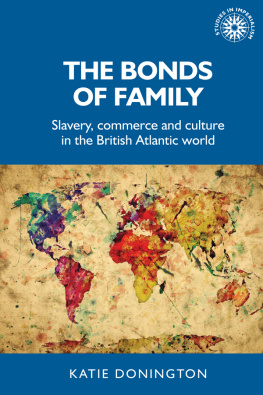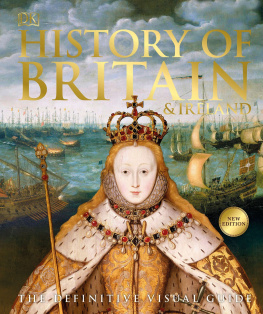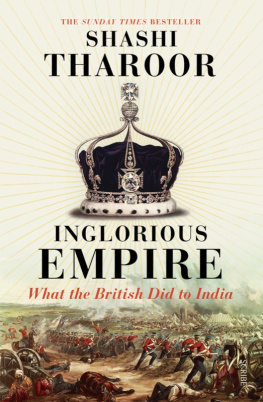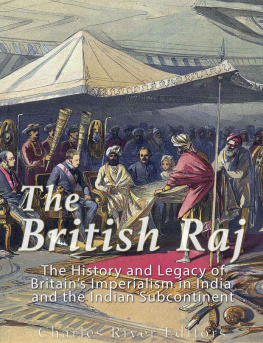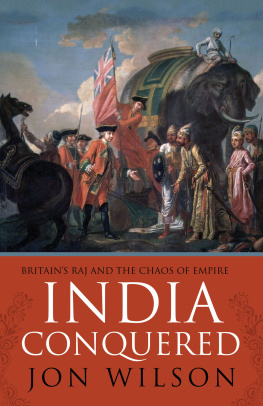DRAGONS
Ten Entrepreneurs Who Built Britain
Liam Byrne
www.headofzeus.com

A bold retelling of Britains national story, narrated not through accounts of kings and queens, or soldiers and scientists but through the lives of ten of Britains greatest entrepreneurs.
How was Britains wealth and power built? Liam Byrne provides new answers. Dragons tells the story of Britains advance through the lives of ten titans of British commerce. Beginning with the Tudor merchants who transformed Englands economy by creating the companies and colonies of the New World, Liam Byrne traces an entrepreneurial golden line through men such as Thomas Pitt, saviour of the East India Company; financier Nathan Rothschild, creator of the modern bond market; the Quaker-capitalist George Cadbury; the imperial buccaneer Cecil Rhodes; William Lever, brand-builder, philanthropist, and creator of Britains first great multinational; and John Spedan Lewis, founder of the employee-owned John Lewis Partnership.
Fast paced and using fresh research, Dragons explains how historys great change-makers helped build not only Britain but the modern commercial world before asking some of todays greatest entrepreneurs: what are the lessons of history for the world-beaters of the future?
To Alex, John and Lizzie
The propensity to truck, barter and exchange one thing for another... is common to all men, and to be found in no other race of animals
Adam Smith, The Wealth of Nations (1776)
Contents
Attempting to translate historic sums of money, or amounts of wealth, into modern equivalents is a notoriously difficult exercise, full of variables, and the result is then open to interpretation. What do those amounts mean in the relative contexts of then and now?
Nevertheless, in a book like this, it is desirable to suggest something of the scale of a transaction, or an individuals fortune, or a companys market value.
Unless otherwise noted, the modern equivalents given which invariably offer a range, and typically appear in phrases such as between 2 billion and 5 billion in todays money use estimates constructed by using multipliers for both average earnings (generally the lower end of the range given) and per capita GDP. These are sourced from the respected website measuringworth.com, whose goal is to offer data rigorously refereed by the most distinguished researchers in the field. I am grateful to this valuable resource.
Entrepreneurs change history. Yet History rarely does them justice.
Entrepreneurs are the flesh and blood, the bones and brains, connecting great men and great forces. And yet they are typically missing from the roll-calls of change-makers that shaped the past, left out of a cast-list dominated by kings and queens and, dare I say it, rather too many politicians.
The balance is beginning, happily, to change. David S. Landes, Joel Mokyr and William J. Baumols remarkable book The Invention of Enterprise , published in 2011, is a wonderful example of the new honour paid to the argument that without entrepreneurs we would have basically nothing of the unprecedented growth miracle of the recent centuries. Dragons is one more push along a trend that I hope will grow. It is an effort to better emplace business change-makers more squarely centre-stage in our national story.
As a history student in Manchester, the spiritual home of free trade, I became well versed in the debate about whether the nations entrepreneurs had failed. But in my own years as a tech entrepreneur, I came to see first-hand that entrepreneurs respond to, and reshape, the opportunities around them. And so I became fascinated by the idea of an economic history that offered a better balance between biography and big forces. This book is an attempt to get the balance right.
Dragons tells the stories of the outstanding British entrepreneurs who helped to shape our national story from the beginning of the thirteenth century when Englands wealth could be measured in wool, and when the first early masters of trade and finance men like William de la Pole, Dick Whittington and Thomas Gresham created for themselves new power behind the thrones of kings and queens. Their heirs helped build what is today the worlds fifth-biggest economy.
Here are entrepreneurs who created the first colonies and companies in America, winning along the way rights and freedoms not just to trade but to keep their profits safe from despotic sovereigns. They were the commercial adventurers who campaigned for a great navy to help fight their wars abroad; they built great trading empires amid the giant old economies of the East, creating at home the worlds largest consumer market and the worlds greatest capital market; they pioneered steam engines that revolutionized power for the business of digging fuel and driving forges and factories; they built the worlds first railway system; they brought mass production to new consumer products, from chocolate to soap; they humbled old empires by trading opium and built new ones digging diamonds and gold, copper and coal; they created the worlds first brand-based multinationals, and found ways of bringing the produce of the world to every corner of Britain. Along the way, they laid the foundations of the nations wonderful cities and welfare state, as they not only created wealth, but invented new ways to share it.
Together, these portraits reveal the best and worst of human endeavour, for here are explorers, inventors and moral leaders, along with fraudsters, warmongers and unembarrassed imperialists. All were risk-takers. Some made fortunes. Some lost them. But together, entrepreneurs such as Robert Rich, Thomas Pitt, Matthew Boulton, Nathan Rothschild, William Jardine, George Hudson, George Cadbury, Cecil Rhodes, William Lever and John Spedan Lewis helped build not only Britain, but the modern world.
*
Picking the figures for the book was, of course, devilishly difficult. If my omissions and choices provoke debate, then I will have succeeded. We should debate far more the new cast of characters who formed todays Britain and todays world. In that spirit, let me explain how the line-up here was selected.
I wanted stories that were perhaps under-told and unfamiliar; stories that helped me illustrate a particular chapter of capitalism through the prism of a life lived; stories that helped me relay the history of places special to our economic advance. I wanted, too, individuals whose impact stretched beyond their business lives to the public realm and the world beyond, to help me make this point: entrepreneurs shape history.
The obvious omission here is women. And that in itself makes a point. The power structures of history left women with little room to flourish and yet, even in the stories I tell here, it is clear that women, often wives, played a critical role as capital-suppliers and counsel in the business worlds of their husbands. I very much hope this will prove a field of business history studied in far more depth that I have been able to offer here.
In every phase of British capitalism tackled, there were choices to make. Why illustrate Britains push into India with Thomas Pitt and not Josiah Child? Why pick Matthew Boulton and not Richard Arkwright as an exemplar of the early Industrial Revolution? The choices get only harder as the Victorian era unfolds. Why the free-trading opium baron William Jardine and not a domestic manufacturer? Why the railway magnate George Hudson and not Isambard Kingdom Brunel? Why none of the great nineteenth-century retailers? Or, in the modern era, why the retailer John Spedan Lewis and not the industrialist Arnold Weinstock? These questions are the stuff of the discussion I want to provoke. In every phase of history, I tried to choose the best illustrator of the dominant trend of the time and someone who remoulded not only business, but Britain itself. My judgement will be imperfect. And I look forward to hearing why.

